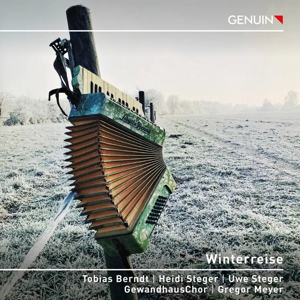
Franz Schubert (1797–1828)
Winterreise op. 89, D 911 (1827, arr. Gregor Meyer for baritone, choir and two accordions)
Tobias Berndt (baritone), Heidi Steger, Uwe Steger (accordions), GewandhausChor/Gregor Meyer
rec. 2022/2023, Mendelssohn-Saal, Gewandhaus Leipzig, Germany
Sung texts with English translation enclosed
Reviewed as download from press preview
Genuin GEN23847 [72]
Schubert’s two song cycles, besides being regularly recorded in the original with voice and piano, also seem to invite transcriptions and arrangements of various kinds. Quite recently, I reviewed a recording of Die schöne Müllerin with accompaniment by a string quintet, and not long ago another accompanied by guitar. Browsing through my collection, I found a Winterreise with parts of the cycle arranged for string quartet, and another with trombone and piano, neither involving a singer. This one under consideration has a singer – and a good one – but the accompaniment is provided by two accordionists and the mighty GewandhausChor with 56 singers. My first reaction was, isn’t that overkill? Well, occasionally there is a tendency to aggressivity in some forte passages, but generally speaking there is a lot of subtlety and soft nuances, as befits an ensemble with such a reputation and tradition, founded as early as 1861. It is still the soloist that is the lead, even though the choir occasionally takes over, but mostly there is interaction between the two, ‘question – answer’ dialogue or they simply join forces for more emphasis. Near the end of the cycle, the choir takes the lead in a couple of songs, giving the impression that the burden of the highly emotional text becomes too heavy for the soloist and the collective has to take over, but in the last song it is the Wanderer who stands alone on the ice regarding the barefoot hurdy-gurdy man, who ‘with stiffened fingers plays as well as he can’. But no one wants to listen to him, the dogs growl, and the Wanderer asks, ‘Shall I go with you?’ Where to? Hamlet gives the answer, ‘The undiscovered country from whose bourn no traveller returns.’ That journey every individual has to make alone, guided by the hurdy-gurdy man.
The choir in several places contributes to the drama. Rückblick (track 8) is a good example. In other places it brings the music closer to the common people, as if in a kind of community singing. That is also one effect of the inclusion of the accordions. The instruments are firmly rooted in the folk music repertoire, and many of Schubert’s melodies have a distinct folk song character. Maybe he wouldn’t have minded, but historically the combination of Schubert and the accordion is an anomaly. The first accordion was patented by Cyrill Demian in Vienna in 1829, the year after Schubert’s death – not that it matters in this context; Heidi Steger and Uwe Steger are professionals to their fingertips and know exactly how to adjust the playing to the musical material. Maybe the opening of the second part of the cycle, Die Post (track 13) is rather too hearty, but that is very much a matter of taste.
So far I have mentioned the vocal soloist Tobias Berndt only in passing, which is very unfair. He is in truth a highly admirable singer; he has a beautiful and flexible baritone, singing very sensitively with unexaggerated feeling and great care for nuances. My impression is that he can stand competition with many of the hundreds of recordings made, from the pioneering Hans Duhan set from 1928 via Gerhard Hüsch (1933), Hans Hotter’s first set in 1942 and Peter Anders in 1945. After WW2 the numbers have accelerated, and picking a clear winner is an almost impossible task. But for those who fancy a recording with baritone, choir and accordions the choice is easy: the present one, and even though a traditional version with solo voice and piano should be a natural choice for first time buyers, seasoned collectors with an inquisitive mind, should be able to derive a lot of pleasure from this recording – as I did.
Göran Forsling
Help us financially by purchasing from




















